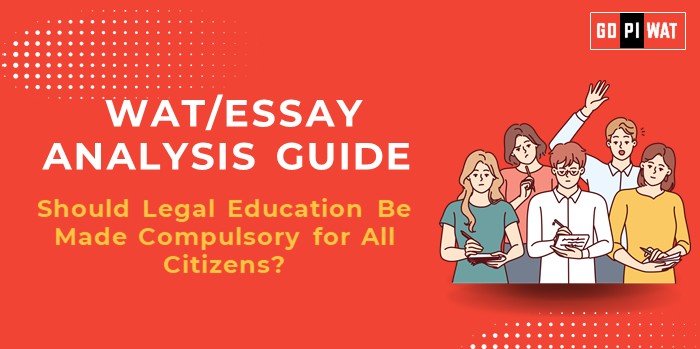📋 WAT/Essay Analysis Guide: Should Legal Education Be Made Compulsory for All Citizens?
🌐 Understanding the Topic’s Importance
Legal education as a universal tool can bridge the justice gap, ensure informed citizenry, and support societal progress.
📖 Effective Planning and Writing
⏳ Time Allocation:
- 📝 Planning: 5 minutes.
- ✍️ Writing: 20 minutes.
- 🔍 Review: 5 minutes.
📋 Preparation Tips:
- 📊 Gather data on judicial pendency and global best practices.
- 🔎 Note stakeholder perspectives and their roles in implementing legal education.
💡 Introduction Techniques
- 🔄 Contrast Approach: “While some citizens lack basic legal literacy, others misuse the system, highlighting the need for universal legal education.”
- ✅ Solution-Based: “Integrating basic legal education in schools can create informed citizens and alleviate the overburdened judiciary.”
📚 Structuring the Essay Body
🏆 Achievements
- 📢 Cite legal literacy campaigns like “Nyaya Bandhu” and their impact in rural areas.
- 🌍 Highlight successful models like Finland’s incorporation of civic education in schools.
⚠️ Challenges with Comparative Analysis
- 📉 Highlight resource constraints, including insufficient funding and trained teachers.
- 🌍 Compare to Finland’s approach, which integrates legal education seamlessly into the school curriculum.
🚀 Future Outlook
- 📱 Focus on technology-driven solutions, such as e-learning modules and mobile apps for legal education.
- 📢 Recommend policy innovations like pilot programs in schools to test feasibility before scaling nationwide.
📝 Concluding Effectively
⚖️ Balanced Conclusion:
“While challenging, universal legal education is a step toward justice and equality, requiring strategic implementation.”
🌏 Global Comparison Conclusion:
“Countries like Finland exemplify the potential of civic education in shaping equitable societies.”
🔍 Analyzing Successes and Shortcomings
- 🏅 Key Achievements: Reduced legal disputes, empowered citizens with greater awareness.
- 🚫 Ongoing Challenges: Resource constraints and public inertia toward educational reforms.
- 🌍 Global Context: Finland and the U.S. offer replicable models of integrating legal education into curricula.
📈 Recommendations for Sustainable Progress
- 📱 Use digital platforms to deliver accessible and scalable legal education.
- 📢 Introduce pilot programs in schools to evaluate and refine the implementation process.
- 🤝 Collaborate with international experts to develop a comprehensive and effective curriculum.
✍️ Sample Short Essays
- ⚖️ Balanced Perspective: “Compulsory legal education can empower citizens and foster justice, yet it demands resources and sustained effort for effective implementation.”
- ✅ Solution-Oriented: “Legal education for all is a necessity. Leveraging technology and phased implementation can bridge the gap in awareness while managing costs.”
- 🌏 Global Comparison: “Finland’s model of integrating basic legal awareness in schools demonstrates the transformative potential of such initiatives.”


